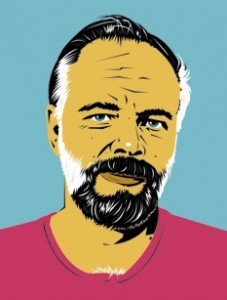
"As an adolescent, not only was Dick asthmatic and overweight, he suffered from eczema and heart palpitations." (Image by Pete Welsch.)
The opening of Joshua Glenn’s 2000 Hermenaut piece about Philip K. Dick:
“Philip Kindred Dick and his twin sister Jane were born in Chicago-six weeks prematurely, on December 16, 1928-to Edgar Dick, a livestock inspector for the U.S. Department of Agriculture, and his wife Dorothy. Jane died a few weeks later. Edgar was transferred to San Francisco the following year, but when he was transferred again in 1933, his wife Dorothy—a feminist and pacifist who felt at home in Berkeley—divorced him. Dick rarely saw his father (who went on to host a radio show in Los Angeles called This Is Your Government) again, and although throughout his life he was financially and emotionally dependent on his mother, he also deeply resented her… and was convinced she wanted to kill him.
As an adolescent, not only was Dick asthmatic and overweight, he suffered from eczema and heart palpitations. His physical condition may help account for his early discovery within himself—while torturing a beetle, in the third grade—of a powerful capacity for empathy: with insects and animals at first, and eventually with weak and powerless human beings, too. He also immersed himself in the fantasy worlds of opera music, L. Frank Baum’s Oz books, and science fiction. (Although pseudo-scientific adventure stories had existed at least since Verne and Wells, the term ‘science fiction’ was coined shortly before Dick was born by Hugo Gernsback, founder of Amazing Stories, the first sf pulp magazine.) Determined to be a writer, at nine Dick wrote, edited, published, and drew cartoons for a short-lived broadside entitled The Daily Dick; at twelve he taught himself to type (he was eventually able to output 120 words per minute); and at fifteen he got his hands on a printing press and published a newspaper called The Truth. But he did not do well in high school: a self-diagnosed agoraphobic and ‘schizoid personality,’ Dick suffered attacks of vertigo, and dropped out in 1947.”
